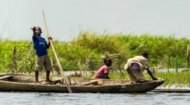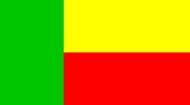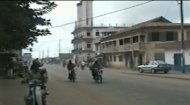|
Benin's social profile is a vibrant mosaic of ethnic groups, languages, and spiritual beliefs, all coexisting with remarkable harmony. The country is home to over 60 distinct ethnic groups, with the Fon, Adja, Yoruba, Bariba, and Peulh being among the largest. Each group contributes unique customs, dialects, and artistic expressions to the national identity. While French is the official language, a multitude of indigenous languages, including Fon, Yoruba, Bariba, and Ditamari, are widely spoken, reflecting the nation's linguistic diversity.
Family values are central to Beninese life, emphasizing strong communal ties, respect for elders, and collective responsibility. Hospitality is deeply ingrained, and visitors are often welcomed with warmth and generosity. The nation's rich artistic traditions are evident in its intricate wood carvings, vibrant textiles, elaborate masks, and storytelling, all of which reflect the deep cultural heritage of its people. Benin's economic profile is primarily agrarian, with agriculture forming the backbone of its economic activity and employing a significant portion of the population. Cotton is the country's main cash crop and export commodity, earning it the moniker "Africa's Cotton Kingdom." Other important agricultural products include cashews, palm oil, maize, and cassava, vital for both domestic consumption and export. The Port of Cotonou is a critical economic asset, serving not only Benin but also landlocked neighboring countries like Niger, Burkina Faso, and Mali as a vital gateway for regional trade. This strategic location makes Benin a significant player in West African commerce. Informal trade also plays a substantial role in the economy, with bustling markets serving as hubs for local and regional exchange. Despite recent economic growth, Benin faces challenges common to developing nations, including poverty reduction, improving infrastructure, and diversifying its economy beyond reliance on agricultural exports. The government has been actively pursuing reforms to attract foreign investment, improve the business climate, and expand sectors such as tourism and digital services. Efforts are underway to boost domestic manufacturing and strengthen regional economic integration, aiming to create more job opportunities and foster sustainable development. The West African CFA Franc is the national currency, pegged to the Euro. Daily life in Benin flows with a distinct rhythm, a blend of traditional customs and modern influences. In bustling urban centers like Cotonou, the economic capital, and Porto-Novo, the official capital, the streets hum with activity. Zémidjans – motorcycle taxis – are an iconic and pervasive mode of transport, weaving through traffic with their distinctive yellow colors. Markets overflow with fresh produce, vibrant fabrics, and a kaleidoscope of goods, serving as social hubs where people gather, trade, and exchange news. Cont/... |
Benin Profile |
Benin Profile |
Benin Profile | Benin Profile |

|
Rural life, in contrast, is often more serene and closely tied to agricultural cycles and community traditions. Villages maintain strong communal bonds, with daily routines often revolving around farming, family gatherings, and traditional ceremonies. Children attend school, while adults engage in various livelihoods, from farming to artisanal crafts. Beninese cuisine is hearty and flavorful, with staple foods like Akassa (fermented corn paste), Pâté (a type of cornmeal dough), and Fufu (pounded yam or cassava) often accompanied by rich, spicy sauces made from groundnuts, palm nuts, or tomatoes, often with fish or meat. Street food is a delight, offering grilled plantains, Akara (bean fritters), and various skewers. Education and healthcare facilities are continually improving, though challenges remain, particularly in remote areas. The government is committed to expanding access to quality education and health services for all citizens. Throughout the year, various festivals and celebrations – from the national Vodun Festival to local harvest celebrations and religious holidays – punctuate daily life, offering opportunities for communities to come together, showcase cultural heritage, and reinforce social ties through music, dance, and elaborate rituals. While Benin may not be the first country that comes to mind for tourism, it does harbour an incredible array of sites that offer deep historical insights and unique cultural experiences: Ouidah: This historic coastal town is a must-visit. It was a major port for the slave trade, and sites like the Door of No Return and the Route des Esclaves (Slave Route) serve as poignant memorials. Ouidah is also a spiritual heartland of Vodun, home to the sacred Python Temple and the Sacred Forest of Kpassè, where visitors can learn about the religion from practitioners. Today Benin is in 173rd place out of 193 countries and territories in 2023 when ranked in terms of life expectancy, literacy, access to knowledge and the living standards of a country. The picture collection (left) shows typical images from Benin and the video (also left) depicts daily life there.
|

 Religion plays a profound role in Beninese society. While Christianity (predominantly Catholic) and Islam are widely practiced, Benin is most famously known as the birthplace of Vodun (Voodoo). Far from the Hollywood stereotypes, Vodun is a sophisticated, deeply rooted indigenous religion that emphasizes reverence for ancestors, nature, and a pantheon of deities (Orishas or Voduns). It is a complex belief system integrating spirituality, community, and moral codes, and it is recognized as an official religion in Benin, with a national holiday dedicated to it. This religious pluralism, characterized by respect and tolerance, is a hallmark of Beninese society, where it's not uncommon for families to practice different faiths under the same roof.
Religion plays a profound role in Beninese society. While Christianity (predominantly Catholic) and Islam are widely practiced, Benin is most famously known as the birthplace of Vodun (Voodoo). Far from the Hollywood stereotypes, Vodun is a sophisticated, deeply rooted indigenous religion that emphasizes reverence for ancestors, nature, and a pantheon of deities (Orishas or Voduns). It is a complex belief system integrating spirituality, community, and moral codes, and it is recognized as an official religion in Benin, with a national holiday dedicated to it. This religious pluralism, characterized by respect and tolerance, is a hallmark of Beninese society, where it's not uncommon for families to practice different faiths under the same roof.








